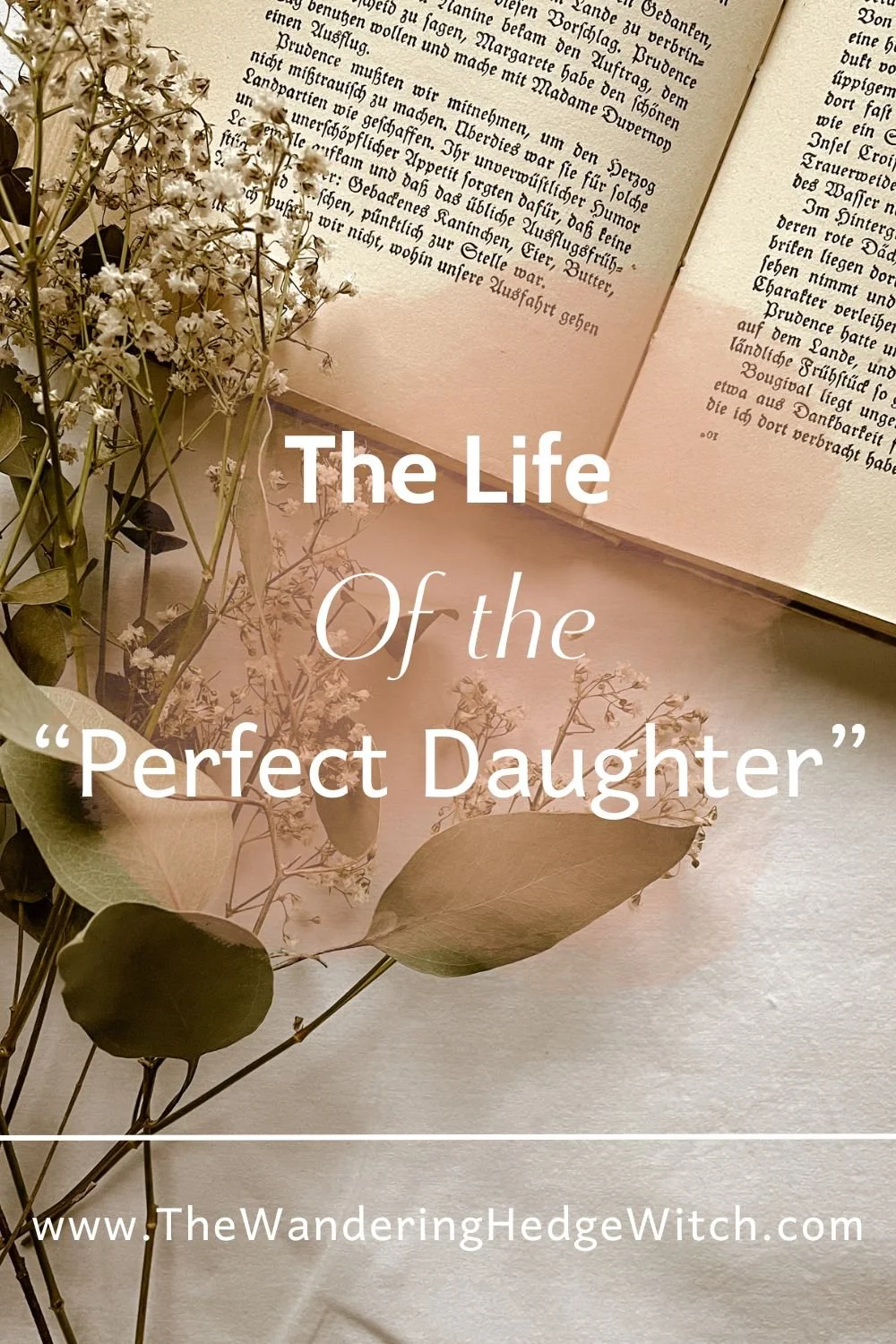The Life of the “Perfect Daughter”
Hello my friends,
Happy Saturday! The past week has been a whirlwind across all fronts—astrologically, dynamic planetary shifts have stirred deep transformations; politically, our world is like a dumpster fire, entertainment has delivered Taylor Swift’s new album and even on smaller, personal scales, change has been palpable, reminding us that every moment holds the potential for evolution and growth.
On my small scale of change, I am shifting to release my new coaching program designed specifically for women like me—those shaped by the pressures of perfect daughter syndrome.
This coaching program is crafted to guide women through the process of unlearning ingrained patterns of perfectionism and self-sacrifice, helping them reclaim their authentic power and embrace a life defined by self-compassion and intentional growth. It’s a transformative journey for anyone ready to break free from unrealistic expectations and step into their true, imperfectly beautiful selves.
To be the "perfect daughter" in the eyes of narcissistic parents is to live under the weight of relentless expectations, where love and approval are conditional upon flawless performance. It means being molded into a version of oneself that serves their needs—tasked with meeting impossible standards, silencing authentic emotions, and suppressing individuality. Raised in an environment where self-worth is measured by compliance and achievement, the perfect daughter often sacrifices her own identity, navigating a world where validation is scarce and autonomy is stifled. This dynamic breeds a lifelong struggle to reconcile internal desires with external demands, forging resilience amidst emotional constraints.
You couldn’t tell by this picture….
My life was what some might call the perfect childhood. From infancy to six years old, I had an extremely charmed life, filled with riches, travels, wonder and complete adorned attention. My parents were extremely well of and my father was a very important businessman in the music industry.
The first six years of my life are the ones I hold most dear because they represent a time untouched by the complexities and judgments that later came with embracing my true path. Those early memories are filled with unfiltered wonder, innocence, and a natural connection to the world around me—before the truth of my lifestyle began to unfold.
Right after this picture was taken, my whole world changed. I turned seven, and my parents decided to adopt my twin brothers. This changed everything, but not in the way some might imagine. It wasn’t just the addition of two new siblings; it was the transformation of how I saw love, family, and myself. Suddenly, my home was a place filled with new dynamics, challenges, and bonds that deepened my understanding of belonging and acceptance.
For whatever the reason, adopting my brothers ignited serious mental health issues in both parents, unraveling layers of stress and emotional turmoil they had been unable to foresee or manage. The sudden shift in family dynamics, combined with the pressures of caregiving and the complexities of adoption, overwhelmed their coping mechanisms. This strain manifested in anxiety and depression, reshaping the household environment and challenging every member to navigate the new reality with resilience and understanding.
This was the change that began my life entering the "Perfect Daughter" syndrome—a relentless pursuit of flawlessness shaped by external expectations and internalized pressure. Suddenly, every decision, every action, felt like a performance designed to appease others rather than honor my own truth. The weight of perfectionism became a veil, obscuring my authentic self beneath layers of compliance and self-doubt. This shift marked the beginning of a complex journey toward reclaiming my identity and breaking free from the invisible chains of approval-seeking.
I was to be the example…
Since I was the eldest, I became the living example my family looked to, carrying the weight of expectations on my shoulders. I had to forego countless desires and silent struggles to pave a smoother path for my brothers, often sacrificing my own needs for theirs. In this role, I learned to conceal my emotions, thoughts, opinions, and even pain, masking my true self behind the façade of what a “good child” was supposed to embody. This relentless self-suppression shaped my early years, teaching me resilience but also leaving a hidden toll on my spirit that I am only now beginning to understand and unravel.
Perfect daughters often learn to walk on eggshells, constantly monitoring the emotions of those around them to maintain peace and avoid conflict. This heightened sensitivity becomes a survival mechanism, shaping their behavior from a young age. For many, this dynamic leads to becoming the parentified child—taking on adult responsibilities prematurely, managing household tensions, and prioritizing others’ needs over their own. The weight of these roles can blur the boundaries between childhood and adulthood, leaving these daughters with a complex blend of maturity and unmet emotional needs.
The worst part is that we are taught this is our sole responsibility, that any deviation from prescribed narratives marks a personal failure. When we dare to stray from these rigid roles, our parents often responded with shame and blame, coercing us back into compliance. This cycle not only stifles individuality but perpetuates a system where accountability is disproportionately placed on the individual, ignoring the broader structures at play.
In families with multiple children, it is very common for each child to have a distinct perception and understanding of their parents. Each sibling experiences unique interactions, moments, and dynamics that shape their individual version of who their parents are. These variations stem from birth order, personality differences, and the evolving nature of familial relationships. As a result, the narrative of the parents becomes multifaceted, with each child's version reflecting a personal, sometimes contrasting, perspective that influences how they relate to their family history and identity.
Moreover, the primary narcissistic parent often elevates one child onto an unrealistic pedestal, using this favored child as a symbol of their own superiority or success. This dynamic serves to reinforce the parent’s self-image, while simultaneously casting the other children as problem children or sources of disappointment. By creating this stark contrast, the narcissistic parent manipulates familial relationships, fostering division and competition among siblings, and ensuring their control through selective validation and criticism. This pattern can leave lasting emotional scars, as each child struggles under intense pressure to maintain an idealized image, while the others grapple with feelings of rejection and inadequacy.
This went on for the majority of my life until I was around my thirties. And as I began the process of removing myself from this toxic family dynamic, the harder it became—each step away felt like peeling back layers of deeply ingrained patterns and unresolved pain. The emotional ties were complex and suffocating, making detachment not just a physical act but an intense spiritual and psychological journey. It demanded unwavering courage, self-compassion, and the willingness to confront shadows I had long ignored. Only through this difficult process did I start reclaiming my autonomy and rediscovering the power within myself to heal and thrive.
Separating yourself from a toxic family dynamic is one of the most challenging and courageous acts you can undertake. At 41, I still feel the residual energy of that upbringing—those invisible scars that linger long after the distance has been created. Healing from such deep-rooted patterns requires patience, self-compassion, and a steadfast commitment to your own well-being. But I am here to tell you this: breaking free is not only possible, it is transformative. You have the power to reclaim your energy, rewrite your story, and create a life defined by peace, strength, and authenticity.
Signs that you were a parentified child or exhibit symptoms of the "perfect daughter" syndrome often include taking on adult responsibilities at a young age, feeling an overwhelming need to please others, and suppressing your own emotions to maintain family harmony. You may have been expected to care for siblings, manage household duties, or act as an emotional caretaker for your parents, leading to chronic stress and a profound sense of duty over your own needs. Perfectionism, fear of failure, and difficulty setting boundaries are common, as is feeling invisible or unacknowledged for your efforts. These patterns can impact self-worth and lead to challenges in relationships and emotional health well into adulthood.
Establish clear boundaries by calmly communicating your limits and expectations, focusing on what you will and will not tolerate. Prioritize your emotional well-being by limiting contact or opting for neutral topics during conversations to avoid triggering conflicts. Cultivate a strong support network outside your family to reinforce your resilience and provide perspective. Practice self-care rituals that ground you, such as meditation or journaling, to maintain clarity and peace amid negativity. Remember, detaching emotionally rather than physically can empower you to interact with toxic family members on your own terms without sacrificing your mental health.
Remember, you are stronger than you think and braver than you know. Within you lies a resilience that has carried you through every silent battle and every whispered fear. The courage that pulses through your veins often goes unnoticed, yet it fuels your determination to rise and face whatever challenges come your way. Trust in your inner power; it is a wellspring of strength and bravery waiting to be embraced, reminding you that no obstacle is too great when met with the fierce heart you possess.
I am here for you, steadfast and unwavering, offering my support through the twists and turns. I believe in your strength and resilience, even when doubt clouds your vision. You possess a unique power within, capable of overcoming obstacles and embracing growth. Trust in yourself as I trust in you, and together we will navigate the path toward your highest potential.
Hugs,
Rebecca
For more info on my coaching….




